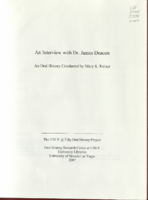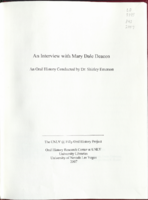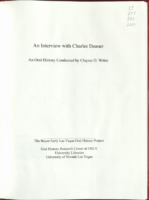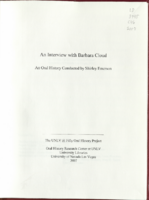Search the Special Collections and Archives Portal
Search Results

Transcript of interview with Norman Christiansen by James Courtney, November 28, 1986
Date
1986-11-28
Archival Collection
Description
On November 28, 1986, James Courtney interviewed Norman Christiansen (born 1931 in Red Lodge, Montana) about his experiences while living in Las Vegas, Nevada. Christiansen first describes his family and background before talking about moving to Las Vegas in 1956 after graduating college in Montana. Christiansen, who worked at the Nevada Test Site for two years and eventually became a teacher at various schools, talks about the various changes he has noticed over the years in Las Vegas, including those in climate, pollution, economy, occupation, and standard of living. Christiansen also discusses his political involvement, his hobbies, the advantages and disadvantages of living in Las Vegas, historical events in Las Vegas, and atomic testing in Nevada.
Text

Transcript of interview with Fermin De Leon by Generoso E. Sayon, March 15, 1981
Date
1981-03-15
Archival Collection
Description
On March 15, 1981, Generoso E. Sayon interviewed his adoptive father, Fermin De Leon (born July 8, 1899 in the Philippines) at his home in Las Vegas, Nevada. This interview covers the Filipino experience in Las Vegas, Nevada, during the 1950s. During this interview, De Leon discusses being a veteran, who served in World War II. De Leon also recalls that most of the Filipinos living in Las Vegas worked as kitchen help in the hotels on the Strip.
Text

Transcript of interview with George Cichoski by Tracey Bradley, March 15, 1981
Date
1981-03-15
Archival Collection
Description
On March 15, 1981, Tracey Bradley interviewed George Cichoski (born 1939 in New Kensington, PA) about the roles and functions of the Cumorah Credit Union, which served members of the Mormon Church. Cichoski first talks about the development of the credit union, the effects of the change from federal to state charters and those advantages, and the overall function of a credit union in general. Cichoski also discusses the Financial Institutions Act and its effects on credit unions, the innovative services that credit unions would need to adopt to retain their members, and what he believes will be in store for the future of credit unions.
Text

Transcript of interview with Helen M. Clark by Danny Winegar, March 5, 1979
Date
1979-03-05
Archival Collection
Description
On March 5, 1979, Danny Winegar interviewed Helen M. Clark (born 1921 in Memphis, Tennessee) about her experiences in Nevada. Clark first describes why she and her family moved to Las Vegas and then explains why she was homeschooled. She then talks about her secretarial work for a prominent real estate agent in Las Vegas and some of her work in that field. Clark also discusses the beginning of tract home building, gambling, and the building of Hoover Dam. She also mentions life during the Great Depression, prostitution in Block 16, and the Helldorado celebration. The interview concludes with Clark’s recollection of the first hotels and casinos that were built on the Strip, including those who built them and the mob influence over them, and a brief mentioning of her experience as a real estate agent.
Text

Transcript of interview with Dr. James Deacon by Mary K. Keiser, August 24, 2006
Date
2006-08-24
Archival Collection
Description
James Deacon was born at home in White, South Dakota. For the first few years of his life, the family moved around a lot to accommodate his father's job as school superintendent. Their summers were spent in a cabin on a lake, where Jim helped his grandparents in their store, seining minnows, clerking, and putting up ice. From his eighth grade year through high school graduation, the family lived in Aberdeen, which was the largest city (population 25,000) they had lived in Jim attended college on a tuition scholarship in Wichita Falls, Texas. He majored in biology and education, and then went to grad school at the University of Kansas. His favorite undergraduate professor knew the fish expert there and encouraged Jim to study fish. Instead of completing a master's degree, Jim went straight into the Ph.D. program. He graduated in the summer of 1960, and started applying for jobs. He interviewed with Dean Bill Carlson for a job at UNLV, which was then called University of Nevada Southern Regional Division. In 1964, Jim and his family moved to Reno and he taught two summers at UNR. As professor of biology, Jim focused on getting students involved in field studies as well as classroom work. He was instrumental in organizing the Department of Environmental Studies, which started in 1992. He also helped develop a master's program and a Ph.D. program in biology. He is best known for his expertise and involvement in the study of the Devil's Hole pup fish, an endangered Nevada species of fish.
Text

Transcript of interview with Mary Dale Deacon by Shirley Emerson, June 21, 2006
Date
2006-06-21
Archival Collection
Description
Mary Dale Deacon was born in El Paso, Texas, and grew up in Las Cruces, New Mexico. Her father was a Presbyterian minister who had been called to Las Cruces before she was born. She and her older sister and younger brother loved to read and spent a great deal of time in the public library. They all attended grade school and high school in Las Cruces. Mary earned her undergraduate degree at the University of New Mexico in Albuquerque, and also took some graduate courses in history. When she transferred to the University of Denver to work on her librarian degree, she was able to use the history credits as her minor. After graduating, she interviewed for a position at the University of British Columbia, requesting government publications as her field of interest, and worked there for the next three years. During this time, she met and married a Canadian who was also a librarian. In 1969, Mary and her husband interviewed at the University of Arizona library, and her husband received a job offer. Mary became a research associate on a book which was published, and also had a research paper published. She was eventually hired as head of government documents at the university, and later took a position as assistant librarian in charge of public services. Mary was recommended for director of libraries at UNLV in 1982. She accepted the job, with all its many challenges, and worked there until she retired in 1992. During those ten years, she was responsible for increasing the book collection and the funding, changing to an integrated automated program, instigating staff development and developing new positions, and finally getting a new library as the number one building project for the university system.
Text

Transcript of interview with Charles W. Deaner by Claytee D. White, April 4, 2011
Date
2011-04-04
Archival Collection
Description
Charles Deaner's narrative begins near Erie Pennsylvania, where he was born. His family history can trace its roots to a grandfather who fought in the Civil War. Charles served in the Air Force and battled in the North African campaign of World War II. After which, he attended college and received a law degree from Syracuse University. At the urging of a sister and brother-in-law who had settled in Las Vegas, he ventured to a changing Las Vegas of the 1950s. He shares stories of his first law practice and legal case. Charles became a leader in his profession and has many stories of how his practice grew during the 1960s and 1970s. His narrative also includes his insights and descriptions of the many changes that have occurred over the decades that he has lived and worked in the Las Vegas community.
Text

Transcript of interview with Rosemary (Conner) Cleman by Beatrice Owens (Gillard), March 8, 1981
Date
1981-03-08
Archival Collection
Description
On March 8, 1981, Beatrice Gillard interviewed Rosemary Cleman (AKA, Rosemary Conner, b. 1926 in New York, New York) about her experiences living in Southern Nevada and her background as a teacher and youth parole counselor. Conner begins by talking about how she ended up in Las Vegas to become a teacher for emotionally disturbed children and how she would eventually assist with the creation of the Nevada Girls Training Center, the first parole program for female juvenile offenders in Nevada. Conner also talks about the development of Las Vegas from when she arrived in 1952, and she discusses the segregation of the African American community in the city as well as her perspectives on the attitudes of the community as they related to it. Conner also mentions her coffee business, her personal interaction with Nevada Supreme Court justices, and her involvement in starting a grant-funded drug treatment program, known as Us, for juveniles. The interview concludes with Conner’s thoughts on the reemergence of mining communities in Nevada and her close interaction with Nevada governors during her roles in social service.
Text

Transcript of interview with Barbara Cloud by Shirley Emerson, May 30, 2006
Date
2006-05-30
Archival Collection
Description
Barbara Cloud was born in Tulare, California. Her father's job kept the family on the move for the first seven years of her life. They eventually settled in Idaho Falls, Idaho, where Barbara attended grade school and high school. After graduation, Barbara applied to three universities and was accepted at all three. She chose Stanford and decided to major in journalism. It was while at Stanford that she also met and married her husband Stan. Stan and Barbara moved to California, where Barbara got a job working on a weekly Sunday supplement. After a year and a half, they returned to Oregon and Barbara decided to get her master's in journalism. She was given a graduate assistantship at the University of Oregon, and completed the degree in two years. In 1969, Stan agreed to accept a post doctoral assignment in Australia, and Barbara found a job with an advertising agency. After six years, the couple returned to Oregon, and Barbara decided to apply to the University of Washington for a PH.D. in journalism. She was admitted, given a graduate assistantship, and completed the work in three years. In 1978, Barbara applied for a journalism position at UNLV. She was hired, and she and Stan moved to Las Vegas in 1979. She built up the journalism program and continued with her research. In 1983, she became department chair, a position she was elected to each year for the next six years. She was the editor of "Journalism History", published her own book, and was associate provost for academic affairs. Barbara is retired today, though still connected with the School of Journalism. She is planning to teach a distance education course.
Text

Transcript of interview with Ed Collins by Steve Smith, March 15, 1981.
Date
1981-03-15
Archival Collection
Description
On March 15, 1981, Steven L. Smith interviewed Edward A. Collins (born on March 16th, 1930, in Chicago, Illinois), at the Dunes Hotel and Country Club. Collins relocated to Nevada in 1955. The interview covers gender equality in the field of culinary arts in Las Vegas. Collins describes the changes he saw take place in culinary over the years. He also discusses Bugsy Siegel’s impact and influence on the emergence of big shows in the hotels on the Strip. Among other jobs, Collins worked as a captain in a showroom at the Frontier Hotel. He discusses Las Vegas before and after Howard Hughes and Bob Maheu appeared on the scene.
Text
Pagination
Refine my results
Content Type
Creator or Contributor
Subject
Archival Collection
Digital Project
Resource Type
Year
Material Type
Place
Language
Records Classification
